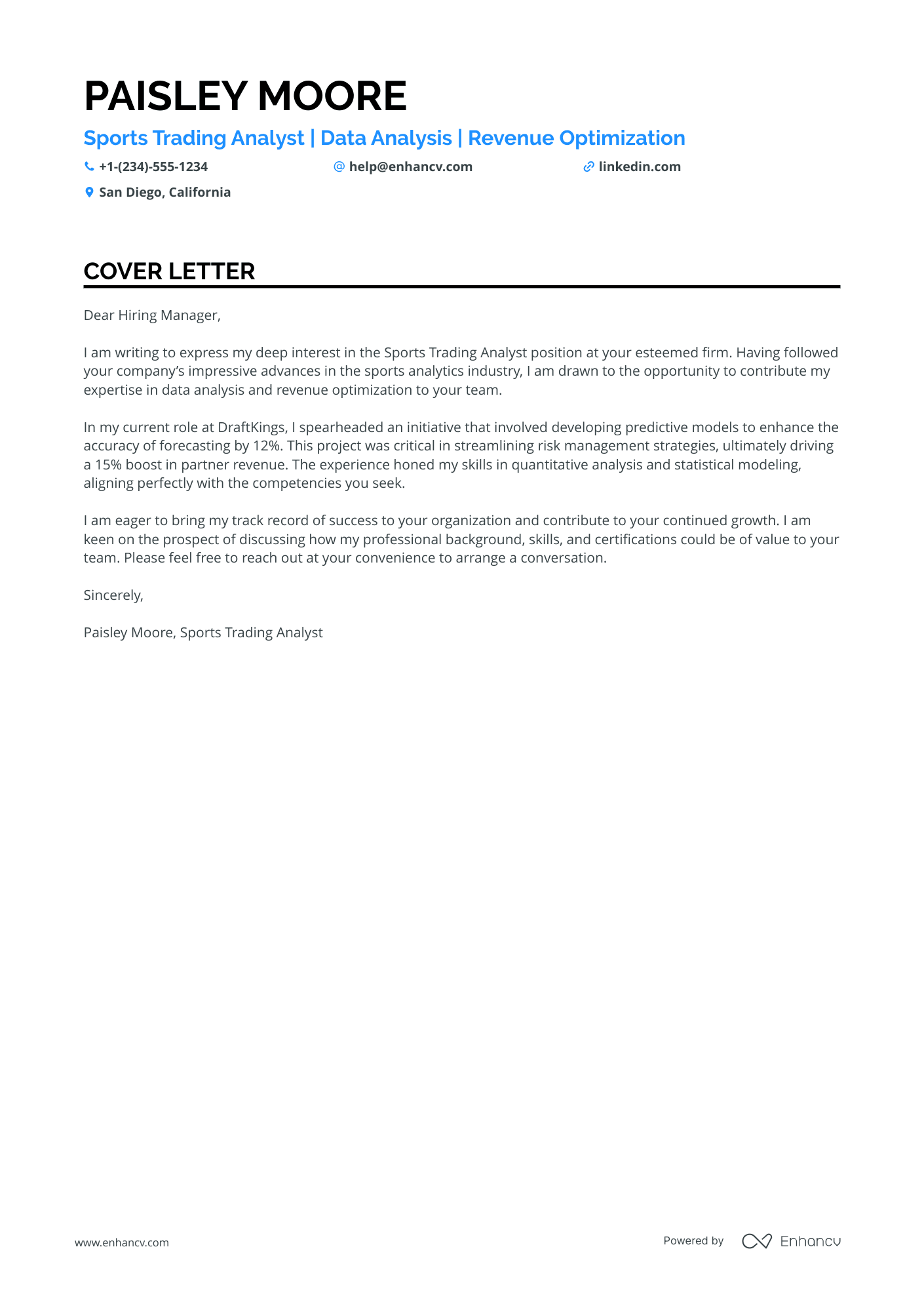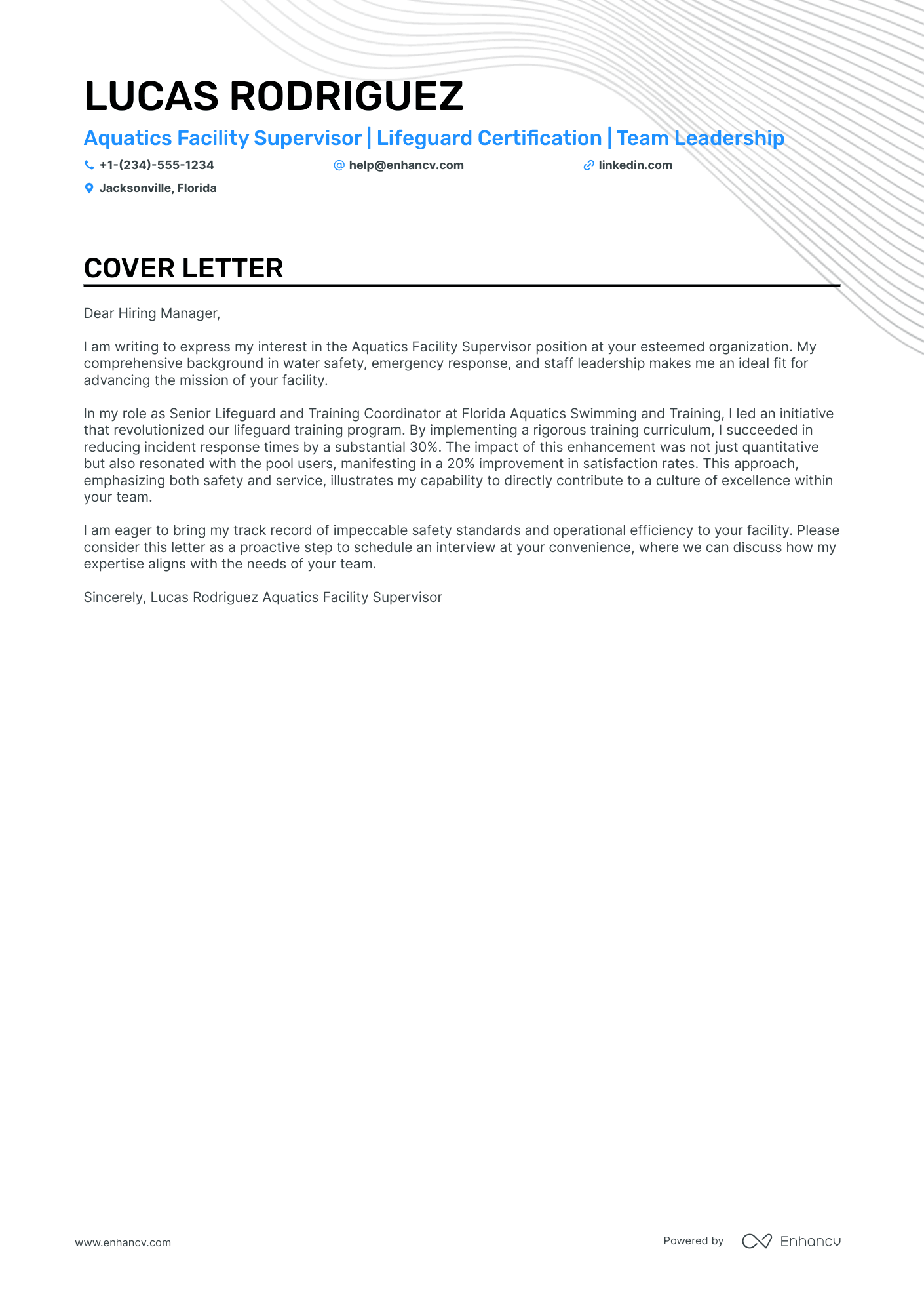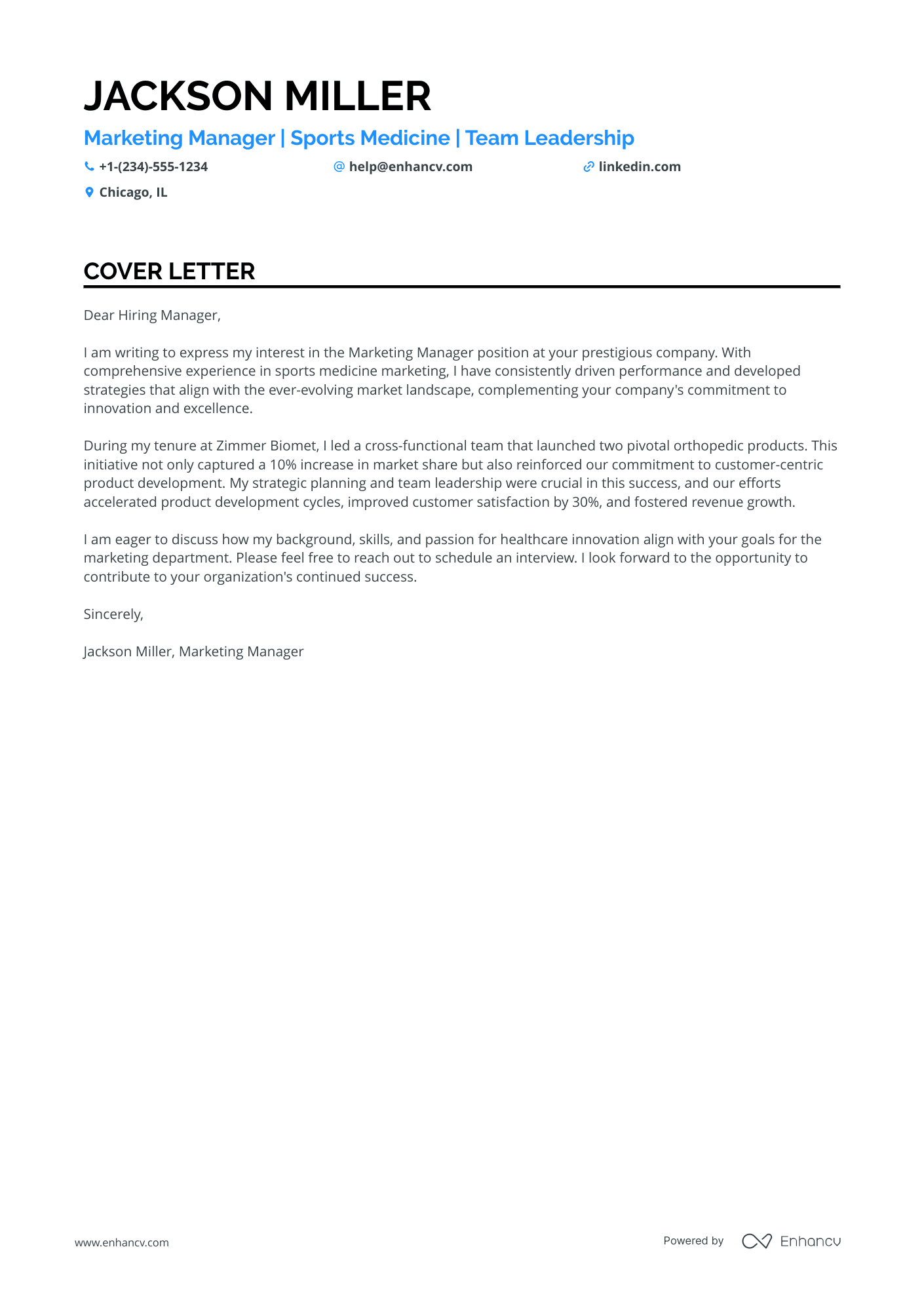Embarking on your job hunt in the sports industry, you've likely unearthed the importance of a standout cover letter. This crucial document lends you the microphone to amplify a professional triumph without echoing your resume. Imagine crafting a narrative that showcases a peak achievement, steering clear of tired clichés, all while maintaining formality and brevity within a single page. Whether you're a rookie or a seasoned pro, perfecting this balancing act in your cover letter can be your game-winning play.
- Some inspiration from other professionals' job-winning cover letters;
- The best structure and format for your sports cover letter;
- Insights on how to write about your best achievement to stand out;
- A creative twist on your sports cover letter intro.
Upload your sports resume to Enhancv's AI, which will quickly scan and prepare a job-winning cover letter for you.
If the sports isn't exactly the one you're looking for we have a plethora of cover letter examples for jobs like this one:
Drop your resume here or choose a file.
PDF & DOCX only. Max 2MB file size.
Sports cover letter example
James Jones
Denver, Colorado
+1-(234)-555-1234
help@enhancv.com
- Quantifiable Achievements: Emphasizing measurable outcomes such as "propelled our revenue by an impressive 25%" showcases the candidate’s ability to deliver concrete results, which is persuasive to hiring managers.
- Relevant Experience Alignment: Strategically linking past work experience, like the "AI-assisted sales strategy" to the job at hand, demonstrates the candidate’s direct suitability and potential to contribute meaningfully to the new role.
- Industry-Specific Expertise: Mentioning familiarity with key industries the company is involved in, such as the "sports and media industries" establishes the applicant's understanding of the sector-specific challenges and opportunities.
- Call to Action: Finishing the cover letter with an eager and proactive invitation for an interview demonstrates confidence and a forward-thinking attitude that is crucial for managerial roles.
What about your sports cover letter format: organizing and structuring your information
Here is one secret you should know about your sports cover letter assessment. The Applicant Tracker System (or ATS) won't analyze your cover letter.
You should thus focus on making an excellent impression on recruiters by writing consistent:
- Header
- Greeting
- Introduction
- Body paragraphs (and explanation)
- Promise or Call to action
- Signature (that's optional)
Now, let's talk about the design of your sports cover letter.
Ensure all of your paragraphs are single-spaced and have a one-inch margins on all sides (like in our cover letter templates).
Also, our cover letter builder automatically takes care of the format and comes along with some of the most popular (and modern) fonts like Volkhov, Chivo, and Bitter.
Speaking of fonts, professionals advise you to keep your sports cover letter and resume in the same typography and avoid the over-used Arial or Times New Roman.
When wondering whether you should submit your sports cover letter in Doc or PDF, select the second, as PDF keeps all of your information and design consistent.
Let us save you time! With our free cover letter generator, you can create a professional letter instantly using your resume.
The top sections on a sports cover letter
- Header: This includes your name, address, phone number, email, and date, which is essential for the recruiter to know who you are and how to contact you.
- Greeting: Address the hiring manager or recruiter by name if possible to demonstrate that you have done your research and are serious about the position.
- Introduction: Clearly state the sports position you are applying for and include a hook, such as a brief mention of a relevant accomplishment or connection to the team, to grab the recruiter’s attention.
- Body: Detail your relevant sports experience, accomplishments, and skills, emphasizing your understanding of teamwork, athletic insight, and any specific sporting achievements that align with the role you're applying for.
- Closing: Reiterate your enthusiasm for the role, mention your desire to provide further information in an interview, and thank the recruiter for considering your application, leaving a professional and lasting impression.
Key qualities recruiters search for in a candidate’s cover letter
- Demonstrated passion for the sport: Showcases a genuine enthusiasm and understanding, which is pivotal for fostering team spirit and engaging with the sport’s community.
- Coaching or athletic experience: Direct involvement in the sport, whether as a coach, player, or official, indicates practical knowledge and expertise.
- Leadership abilities: Essential for guiding teams, leading practices, and influencing positive outcomes; demonstrates the capacity to mentor and inspire athletes.
- Communication skills: Crucial for effectively conveying strategies, providing feedback, and liaising with staff, athletes, and other stakeholders.
- Strategic thinking and game knowledge: Reflects the ability to analyze games, develop game plans, and adapt strategies to different scenarios.
- Success metrics: A history of measurable achievements, like win/loss records, championship titles, or player development, proving the ability to deliver results.
What matters most when tailoring your sports cover letter salutation
Your sports cover letter greeting should feel welcoming to recruiters.
Use their first name (e.g. "Dear Marshall" or "Dear Sara"), if you've previously been in touch with the hiring manager and are on a more friendly basis.
If this is the first time you're contacting the recruiters, start your sports cover letter with:
- their last name (e.g. "Dear Ms. Ali" or "Dear Mr. Stevens") - look up who's the hiring manager for the role on social media or the company website;
- generalized greeting (e.g. "Dear HR Team") - just don't use "To whom it may concern" or "Dear Sir/Madam".
List of salutations you can use
- Dear Hiring Manager,
- Dear [Company Name] Recruiting Team,
- Dear [Department] Manager,
- Dear Mr./Ms. [Last Name],
- Dear [First Name] [Last Name],
- Dear Coach [Last Name],
Get creative with your sports cover letter introduction
Recruiters are going to assess plenty of candidate profiles for the role. Thus, anything you do to stand out will win you brownie points.
Use your sports cover letter introduction to share something memorable about your experience.
But before you go down the rabbit hole of creativity and humor, align your message with the company culture.
For example, if you are applying for a role in some startup, use those first two sentences to tell a funny story (about your experience) to quickly connect with the recruiter.
What to write in the body of your sports cover letter
Now that you've got your intro covered, here comes the heart and soul of your sports cover letter.
It's time to write the middle or body paragraphs. This is the space where you talk about your relevant talent in terms of hard skills (or technologies) and soft (or people and communication) skills.
Keep in mind that the cover letter has a different purpose from your sports resume.
Yes, you still have to be able to show recruiters what makes your experience unique (and applicable) to the role.
But, instead of just listing skills, aim to tell a story of your one, greatest accomplishment.
Select your achievement that:
- covers job-crucial skills;
- can be measured with tangible metrics;
- shows you in the best light.
Use the next three to six paragraphs to detail what this success has taught you, and also to sell your profile.
Finishing off your sports cover letter with what matters most
So far, you've done a fantastic job in tailoring your sports cover letter for the role and recruiter.
Your final opportunity to make a good impression is your closing paragraph.
And, no, a "Sincerely yours" just won't do, as it sounds too vague and impersonal.
End your sports cover letter with the future in mind.
So, if you get this opportunity, what do you plan to achieve? Be as specific, as possible, of what value you'd bring to the organization.
You could also thank recruiters for their interest in your profile and prompt for follow-up actions (and organizing your first interview).
Lacking experience: here's how to write your sports cover letter
As a candidate with no experience, it's important to be honest from the get-go of your application.
Use your sports cover letter to sell your unique talents. Choose an accomplishment from your academic background or your volunteer work to show the skills that are relevant to the role.
Focus on your career objectives and how you see the job to align with them. Be specific and, at the same time, realistic about where you picture yourself in five years.
Key takeaways
Within this Enhancv guide, we've provided you with plenty of advice and inspiration on writing your sports cover letter:
- Always make sure your sports cover letter is tailored to the role you're applying for to make a good impression on recruiters;
- In your sports cover letter include a header (with your name, the role you're applying for, date, and contact details) and an introduction of up to two sentences that highlight your key accomplishment or why you'd fit the role;
- Focus your sports cover letter body on one sole achievement through your career and all the valuable lessons, skills, and know-how you've learned (that are relevant to the role);
- Ensure your sports cover letter closing statement isn't generic and includes either a call to action or a promise;
- If you lack professional experience, shift recruiters' focus to a relevant achievement (thanks to your academic or versatile experience) or toward your dreams and goals for professional growth.
Sports cover letter examples
By Experience
Entry-Level Sports Analyst
- Highlighting Relevant Experience: The cover letter specifically mentions a role at DraftKings where the applicant led predictive modeling initiatives. This experience directly correlates with the analytical and forecasting skills needed for a Sports Trading Analyst position.
- Quantifying Achievements: The letter effectively uses percentages to illustrate the impact of the applicant's work, such as a 12% improvement in forecasting accuracy and a 15% increase in revenue. Quantifying outcomes provides concrete examples of the applicant’s contributions and results-driven approach.
- Alignment with Company Values: The applicant references the company’s advances in sports analytics, demonstrating awareness of the company’s work and aligning personal goals with organizational objectives, which can make the application more compelling.
By Role
Lifeguard
Sports Marketing Manager
- Industry-Specific Experience: The candidate highlights their experience in sports medicine marketing, which is directly relevant to the role and demonstrates a deep understanding of the specific market dynamics.
- Quantifiable Achievements: They provide concrete metrics, such as capturing a 10% increase in market share and improving customer satisfaction by 30%, which showcase their effectiveness and impact.
- Leadership and Strategic Planning: The letter emphasizes leadership and strategic planning skills, essential for a Marketing Manager, by detailing the successful launch of orthopedic products through teamwork and strategic initiatives.
- Alignment with Company Values: Their expression of interest aligns with the values of innovation and excellence that the company upholds, indicating a good cultural fit and genuine enthusiasm for contributing to the company's mission.







